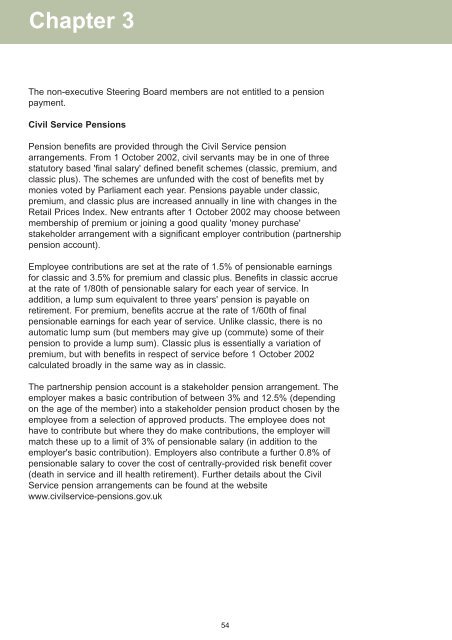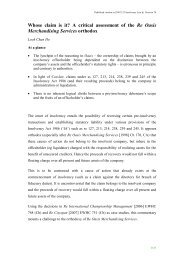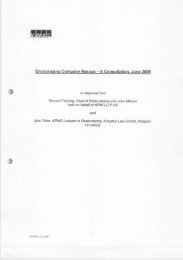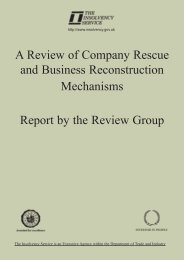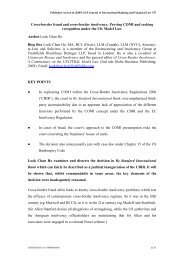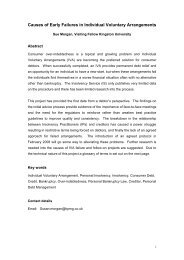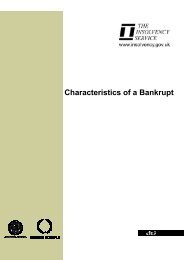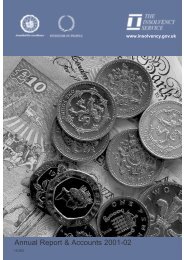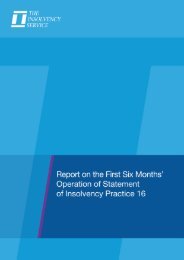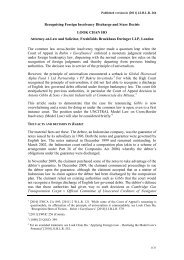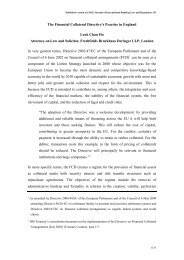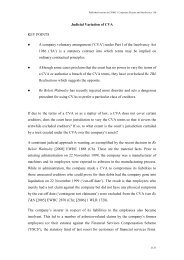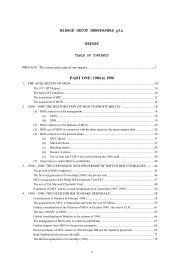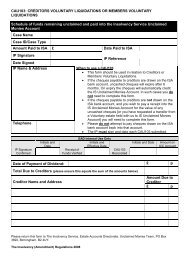Chapter 2 - The Insolvency Service
Chapter 2 - The Insolvency Service
Chapter 2 - The Insolvency Service
Create successful ePaper yourself
Turn your PDF publications into a flip-book with our unique Google optimized e-Paper software.
<strong>Chapter</strong> 3<br />
<strong>The</strong> non-executive Steering Board members are not entitled to a pension<br />
payment.<br />
Civil <strong>Service</strong> Pensions<br />
Pension benefits are provided through the Civil <strong>Service</strong> pension<br />
arrangements. From 1 October 2002, civil servants may be in one of three<br />
statutory based 'final salary' defined benefit schemes (classic, premium, and<br />
classic plus). <strong>The</strong> schemes are unfunded with the cost of benefits met by<br />
monies voted by Parliament each year. Pensions payable under classic,<br />
premium, and classic plus are increased annually in line with changes in the<br />
Retail Prices Index. New entrants after 1 October 2002 may choose between<br />
membership of premium or joining a good quality 'money purchase'<br />
stakeholder arrangement with a significant employer contribution (partnership<br />
pension account).<br />
Employee contributions are set at the rate of 1.5% of pensionable earnings<br />
for classic and 3.5% for premium and classic plus. Benefits in classic accrue<br />
at the rate of 1/80th of pensionable salary for each year of service. In<br />
addition, a lump sum equivalent to three years' pension is payable on<br />
retirement. For premium, benefits accrue at the rate of 1/60th of final<br />
pensionable earnings for each year of service. Unlike classic, there is no<br />
automatic lump sum (but members may give up (commute) some of their<br />
pension to provide a lump sum). Classic plus is essentially a variation of<br />
premium, but with benefits in respect of service before 1 October 2002<br />
calculated broadly in the same way as in classic.<br />
<strong>The</strong> partnership pension account is a stakeholder pension arrangement. <strong>The</strong><br />
employer makes a basic contribution of between 3% and 12.5% (depending<br />
on the age of the member) into a stakeholder pension product chosen by the<br />
employee from a selection of approved products. <strong>The</strong> employee does not<br />
have to contribute but where they do make contributions, the employer will<br />
match these up to a limit of 3% of pensionable salary (in addition to the<br />
employer's basic contribution). Employers also contribute a further 0.8% of<br />
pensionable salary to cover the cost of centrally-provided risk benefit cover<br />
(death in service and ill health retirement). Further details about the Civil<br />
<strong>Service</strong> pension arrangements can be found at the website<br />
www.civilservice-pensions.gov.uk<br />
54


